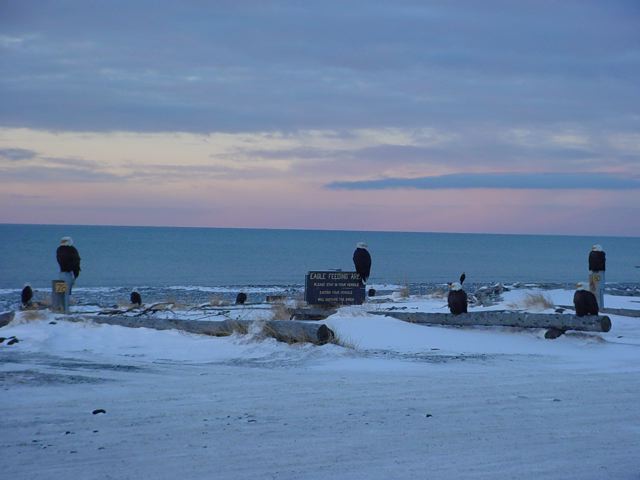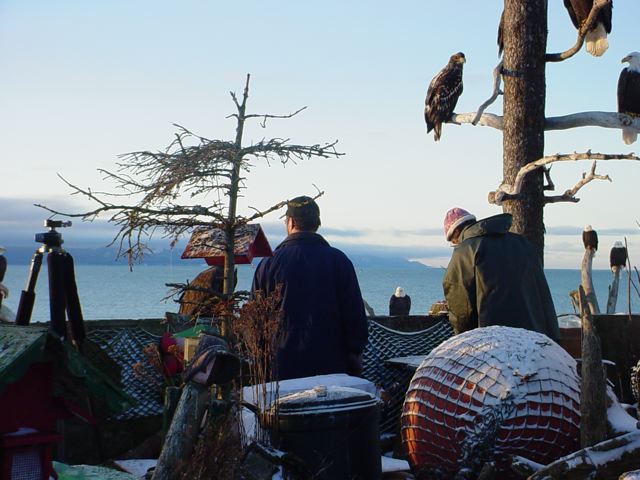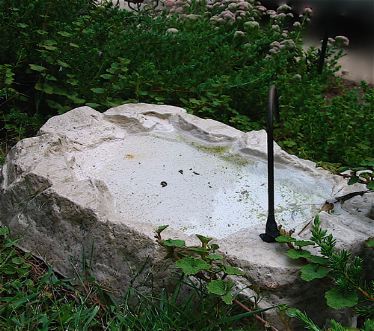-
Finch Feeders and Bald Eagles?
Yes, this post was planned for Finch Feeders, but a I received a very cool email this morning from a friend. Now I’m not sure if this has circulated or saturated the media, but definitely worth posting!
Several months ago (January [in Oregon ]), the weather stayed so cold that the bald eagles were cruising over our houses looking for helpless cats to make a quick meal.
They could not access fish that were at the bottom of the river and had gathered together.
Some kind souls decided to feed the eagles down at Goose pit so they would survive the cold spell. They gathered fish and started feeding the group of eagles huddled on the shore.
The photos below show what happened.
A former teaching colleague took these photos in front of his home. Incredible!Feeding the Eagles!
A beautiful morning feeding the eagles, Jan. 2010
Once we started throwing out fish, they did not seem to fear us and word spread fast.
Eagles fighting for the fish. Jan. 2010
No zoom lens here, I was this close!
Here are the men who were feeding them. It was so amazing to get this close!
It was not too long ago that the American Bald Eagle was an endangered species.
-
Add a Birdbath for Wildlife Friendly Habitat
Our North Georgia yard is always fluttering with avian activity. Probably due to the many bird feeders and birdhouses, but positively because of the birdbaths and water features. For the last 30 days or so I think it has rained only once. Pastures and lawns are parched, and flowers that usually thrive well into fall have seen better days.
Two pedestal baths each have their own gizmo so there’s always moving water. One has a dripper, the other a water wiggler. Since this water always moves, it is a major attractor for birds, it works like a visual magnet! It’s also good to know that mosquitoes can not lay their eggs in these birdbaths.
This ground birdbath with an attached dripper has got to be by far the most popular spot. Of course everyone took off when I went to take the picture. There’s also a leaf mister staked in the ground nearby, which shares the same water connection via a T-connector in the rubber tubing. Butterflies, hummingbirds and most of the regulars frequent this spot daily. Some birds even crowd around to wait their turn for a dip in this great birdbath!
The landscaping helps too, lush and mature trees, shrubs and flowers, with perennials for butterflies like lantana, milkweed, and butterfly bush. A shepherd’s hook with three bird feeders is also close to this water feature. I guess if I were a bird, it would be a pretty decent spot to hang around!
-
Try This Food at Squirrel Feeders
Some folks despise them, for the pesky, destructive behavior their famous for. But others quite enjoy squirrel’s antics and even feed them out of kindness and maybe for entertainment too! Whether you love them or hate them, squirrel feeders are abundant in the marketplace. Crafted from wood, metal, and even recycled plastics, these designs will provide easy access (and sometimes not so easy) for squirrels to find food.
Many squirrel feeders are designed to hold corn cobs, as these are a favorite food for the little critters, (along with peanuts, birdseed, and suet). Squirrels are capable of consuming four times their weight in food in just one week, so the cobs can go pretty fast – usually needing to be replaced on a daily basis.
Corn Logs are a great alternative to traditional corn cobs. They’re basically compressed corn, and one log is equal to about twelve ears of corn. The corn logs around our house usually last about two to three weeks. But beware…the logs must be securely attached to the stake or pin on the squirrel feeder, because our crafty critters have managed to steal them every once in a while!









